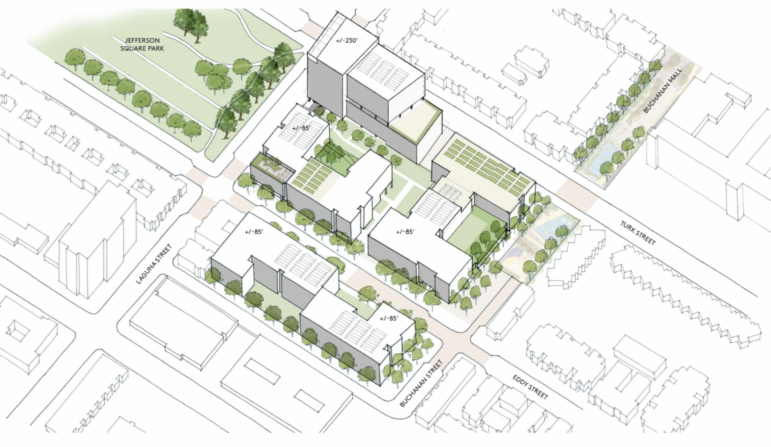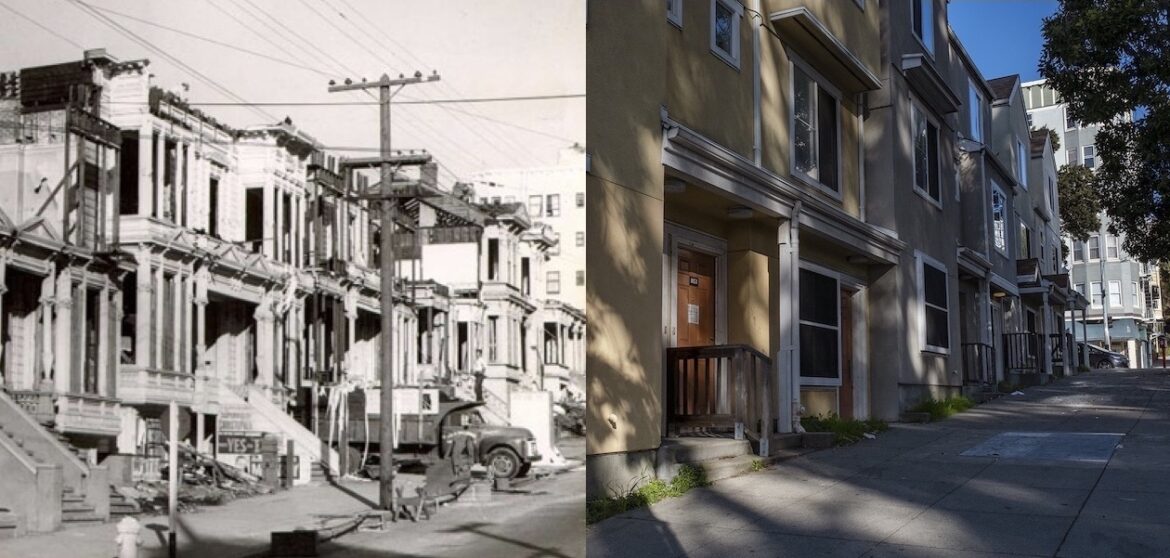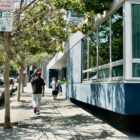More than a year after emergency maintenance work was to have been completed at a Western Addition public housing site, dozens of units were still in need of “moderate to extensive repairs,” according to a May report submitted to the city by the owner. The developers of Plaza East Apartments did not provide a timeline for when repairs would be completed during a May 25 San Francisco Housing Authority Commission meeting.
Meanwhile, the U.S. Department of Housing and Urban Development in late May gave the 22-year-old complex a failing physical inspection score of 40 out of 100 as part of its regular oversight process to ensure safe conditions in subsidized housing.
Andrew Ten, a HUD public affairs officer whose jurisdiction includes San Francisco, wrote in an email that issues related to building exteriors, systems and other health and safety concerns contributed to Plaza East’s failing score.
Failing scores “are not a common experience, but it does happen,” Ten wrote.
Neither McCormack Baron Salazar, which owns the complex, nor the San Francisco Housing Authority have responded to requests for details regarding the failing score. Pedro Abril, who works for the John Stewart Company, which provides management services for Plaza East, said at the meeting that the complex is filing an appeal with HUD regarding certain line items noted in the inspection, but that reversing those may not give the property a passing score of 60.
HUD expects the San Francisco Housing Authority to immediately correct and document the correction of the most pressing health and safety issues at the 193-unit complex, and the federal agency will conduct a follow-up inspection in a year, Ten wrote.
Of all public housing sites in the country, 13% failed their most recent inspections, according to data posted on HUD’s website, which includes inspection data through October 2022. Prior to the May inspection, HUD last inspected Plaza East in January 2017 and gave it a passing score of 82. HUD paused on-site visits during the pandemic.
Additional Plaza East units had been repaired since the May report, and repairs had been completed on 154 units, according an email sent Tuesday by the Housing Authority. Because every single unit needed emergency fixes, 39 still await repairs.
San Francisco gave McCormack Baron Salazar a $2.7 million loan to fix habitability issues at Plaza East in April 2021. A schedule outlined in the loan indicated that the work would be completed by May 30, 2022. As of this week, the company had used about 66% percent of the available loan, according to Audrey Abadilla, a communications and outreach associate at the Mayor’s Office of Housing and Community Development.
At the meeting, Joaquín Torres, president of the Housing Authority Commission, expressed frustration at the slow pace of repairs and poor oversight by McCormack Baron Salazar.
“I just want to say again, as I did last month and the month before that, that these gaps in repair service are quite simply not helping any of us achieve the goal of building confidence and trust with the residents,” Torres said. “The rate at which these issues are being quote resolved or quote addressed is something that is tremendously disappointing right now. And I want to be sure that this is something that is taken seriously, because the manner in which we’re getting this information — or rather not getting information — continues to be extremely dispiriting.”
The city hands out loan money through reimbursement, which the recipient can request once a month. The Mayor’s Office of Housing and Community Development aims to process requests within 30 days. The contractor making repairs at Plaza East typically does about $50,000 worth of work and then stops until the reimbursements come through, which can result in interruptions of two to four weeks, Jerry Johnson, an associate project manager at McCormack Baron Salazar, said at the recent Housing Authority Commission meeting.
Other factors contributed to slow repairs, including staffing shortages and supply chain delays related to the coronavirus pandemic, a transition to new property management, severe winter weather, and resident concerns regarding repairs and relocation efforts, Abadilla wrote. McCormack Baron Salazar managed Plaza East until it hired the John Stewart Company, which has managed the property since June 2021.
On top of the approved loan, the city has provided an additional $160,000 loan to McCormack Baron Salazar because the company “didn’t have the operating funds to support their portion of the services contract” for the 2022-23 fiscal year, Abadilla wrote in an email.
Operating funds will continue to be a challenge for Plaza East in its current configuration, according to a written statement from the Housing Authority.
“The existing funding model is not able to consistently and substantially address all necessary repairs,” according to the statement. “In the short term, all repairs are prioritized by health and safety. In the long term, Plaza East must be rebuilt, which will provide brand new units that our residents deserve and higher operating subsidies to keep those units in good condition.”
In a March 2021 interview, Adhi Nagraj — who at the time was McCormack Baron Salazar’s senior vice president and director of development, and is now the company’s chief development officer — blamed a lack of federal funding for ongoing maintenance issues, saying that dwindling federal subsidies have led to a situation where there is not enough funding for repairs. The company cited the decline of federal funding for public housing as part of the rationale for the company’s plan to tear down the complex and replace it with a mix of market-rate and subsidized units.
Redevelopment plan and next steps
In August 2022, McCormack Baron Salazar and the Housing Authority submitted a preliminary proposal to the San Francisco Planning Department that included replacing Plaza East’s existing 193 public housing units and adding 270 market rate and 292 affordable units that would be rented below market rate to tenants who qualify by income. This proposal almost quadruples the existing number of units, and could add 200 to 300 more units than a plan to redevelop the site from two years ago.
The future of Plaza East Apartments has been up in the air since January 2021, when McCormack Baron Salazar requested permission from the U.S. Department of Housing and Urban Development to demolish the then 20-year-old public housing complex and rebuild it as a mixed-income site with 450 to 550 units. This proposal was supported by Mayor London Breed and the San Francisco Housing Authority.
HUD denied that request in March 2021, determining that the costs of rehabilitating the complex did not meet a high enough threshold to merit demolition and redevelopment according to the program under which the developer originally applied.

The developer is working on next steps to seek approval from the Planning Commission and the Board of Supervisors for the current proposal. Housing Authority representatives hope the application will be submitted this year, according to a statement sent in response to questions about the proposal.
“We are hopeful that pending additional discussions with the community, an application will be submitted this year,” according an early May statement from the Housing Authority. Once that happens, the project approval process is expected to take about two years before construction can begin.
Supervisor Dean Preston, whose district includes Plaza East, called living conditions there “unacceptable.”
“My office has stood with tenants demanding repairs and a tenant-led process for planning the future of Plaza East,” Preston said in an emailed statement. “We successfully pushed for $2.7 million that was released for repairs at Plaza East, and won $20 million in last year’s budget for life-safety repairs in public housing which the Mayor’s Office of Housing and Community Development continues to delay. It’s time for the city to listen to residents, finish the emergency short term repairs, and create a real tenant-supported plan for the future of Plaza East.”
McCormack Baron Salazar did not respond to multiple requests for comment regarding the ongoing repairs or future plans for redevelopment of the site.
Following HUD’s rejection of its 2021 demolition plans, McCormack Baron Salazar has shifted gears to focus on a different HUD program. This would involve tearing down the existing property and converting it to a new operating model, which “offers the best financial resources to rebuild the existing public housing units at Plaza East and secure ongoing subsidies that are stable, predictable, and greater than those provided through the Public Housing program,” according to a statement from the Housing Authority.
Many tenants oppose rebuilding the site as mixed-income housing, and at least 100 of them signed a petition last June asking the developer to consider alternatives, such as rebuilding the site as 100% affordable housing. They said the developer should not move forward without tenant input and transparency.
“We want to make sure that we’re not played,” resident Yolanda Marshall told Mission Local last June.
Poor conditions and ongoing vacancies
Department of Building Inspection records document a history of problems at the site, including leaks, mold and pest infestations. In November 2021, several tenants whose units received emergency repairs said the fixes were inadequate. As of June 6, Department of Building Inspections records showed 11 unresolved complaints and 28 outstanding code violations at Plaza East, bringing the total number of violations at the site to 136 since 2004.
A group of 18 tenants at Plaza East sued for damages in May 2021, alleging that their units posed “severe health and safety hazards,” citing habitability issues such as mold growth, leaks and vermin. The plaintiffs also alleged that the building’s management, which was McCormack Baron Salazar at the time, harassed them and refused to carry out necessary repairs. The group settled in January, though the terms of the agreement were not divulged by the plaintiff attorneys or accessible online.
Since the owner initiated emergency repair work, vacancies at the site have gone up.
As of June 1, there were 25 vacancies at Plaza East, according to an email from the Housing Authority. At the start of the repairs process, there were 20, nine of which were supposed to be immediately repaired and leased out to new tenants, according to the loan agreement.
Vacant units at a public housing site reduce the operating subsidy provided by HUD, wrote Ten, the regional public affairs officer at HUD, adding that it is in the Housing Authority’s best interest to maximize occupancy.
Both the Mayor’s Office of Housing and Community Development and the Housing Authority are concerned about long term vacancies, but Plaza East is not filling vacant units unless they are being used to house existing Plaza East residents. Such practices are common at large public housing properties slated for redevelopment, Abadilla wrote.
The Housing Authority and the site property manager, the John Stewart Company, are responsible for filling vacancies, according to a statement from the Housing Authority. However, “even if all units on site were occupied, Plaza East would still not receive enough subsidy to pay for all necessary operating costs.”
UPDATED 06/07/23: This article was changed to indicate that emailed statements sent by Linda Mason, general counsel for the Housing Authority, should be attributed to the San Francisco Housing Authority, not to her individually.










